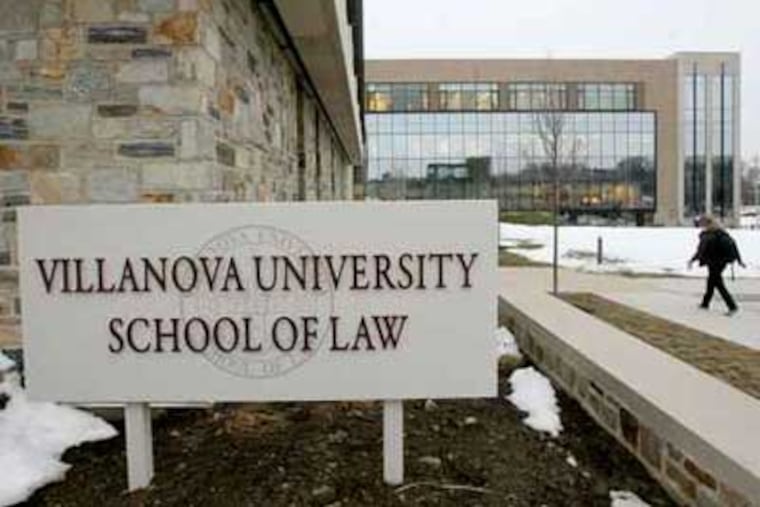Villanova Law says its pre-2010 admissions data was inflated
Villanova University says its law school inflated grade point averages and other admissions data, which figure into a school's national rankings, for an unspecified number of years before 2010.

Villanova University said Monday that its law school had inflated grade point averages and other admissions data, which figure into a school's national rankings, for an unspecified number of years before 2010.
The university said it had launched an internal investigation into the matter.
Faculty, staff, and alumni of the law school were informed of the findings in an e-mail by the dean of the law school, John Y. Gotanda, who said the inflated data on incoming freshmen were disclosed to him Jan. 20.
He described the disclosure as a matter of "serious concern."
"The internal investigation and audit findings show that the inaccuracies were knowingly reported to the American Bar Association by individuals at Villanova Law School," said Gotanda, who took over as dean Jan. 1. "The university will hold those responsible accountable."
The university has hired the Boston law firm of Ropes & Gray L.L.P. to conduct the investigation. Gotanda did not respond to a request for an interview Monday. The university declined to say whether the results would ever be made public.
The inflated academic credentials were discovered by a committee of the law school trying to correlate academic performance with the admissions scores of incoming freshmen, said university spokesman Jonathan Gust.
Gust declined to identify the employees involved in the grade and test-score inflation. Nor would he say whether they are part of the law school's administration or whether they had retained counsel or explained their actions.
He also declined to discuss whether they are still on staff, although Gotanda's e-mail seemed to suggest at least some are.
"It is university policy not to discuss matters relating to personnel," Gust said.
But the news swept through the campus Monday, and it was discussed prominently on the widely read legal blog Above the Law.
A number of students declined requests to be interviewed, and none would agree to be quoted by name. But one, a 22-year-old man from out-of-state, said the students felt betrayed by the disclosure that data used to evaluate the school had been falsified.
"All we know is something is going on and they are trying to resolve it as quickly as possible," the student said. "That was a business decision to come to this law school based on its ranking. That's false advertising."
Gust said the university had confirmed that data for the first-year law students beginning in the fall of 2010 were correct.
The falsified data appear to have occurred under the administration of Mark Sargent, the former dean of the Villanova law school. Sargent stepped down in June 2009 amid disclosures that he had been cooperating with police in a Kennett Square prostitution investigation. Sargent was one of two customers who provided information to police that resulted in a no-contest plea by the man running the ring. Sargent was not charged.
Villanova ranked 67 out of 184 U.S. law schools, according to U.S. News & World Report, and it was tied with Brooklyn Law School, the University of Kansas, University of Pittsburgh, and the University of New Mexico. Tied at 72, the next notch down, were Pennsylvania State, Seton Hall, St. John's, Temple, and others.
Rutgers - Camden and Newark - are ranked at 80, while the University of Pennsylvania Law School and the University of California at Berkeley are tied at seventh.
Bucky Askew, a consultant to the American Bar Association on legal education, said admissions data from law schools are used in the accreditation process and to publish jointly with the Law School Admissions Council an annual compilation of law school statistics and other information called the Official Guide to ABA Law Schools.
The guide is intended for use by prospective students seeking to evaluate the quality of law schools and their chances for admission.
Those data are then accessed by U.S. News for use in its yearly ranking of law schools.
Askew declined to discuss the Villanova case in any detail, citing ABA confidentiality policy.
But he said he doubted the embellishing of academic credentials at Villanova had anything to do with the school's accreditation, which is not in question.
"The data is important; and obviously truth-telling is important in the accreditation process for a wide variety of reasons, plus it is also used for consumer information," Askew said.
Rankings such as those published by U.S. News, though viewed with some disdain in higher education, are nonetheless closely followed because they draw alumni attention and because the most highly ranked schools attract the largest and best applicant pools.
Gust said that the university had determined that the inflation on the law school admissions test, or LSAT, never exceeded the true scores by more than 5 percent.
Gotanda, in the e-mail to Villanova law school students and faculty, said the university had begun to revamp its system for collecting and distributing admissions data, in response to the disclosures.
"Moving forward, I assure you that VLS will continue to thrive and become stronger," Gotanda wrote.
With legal employment far down from where it was before the recession hit in late 2007, these are gloomy times in American law schools. Many students graduate with loans of $100,000 or more.
To find that lucrative employment, once practically a given provided grade point averages were high enough, has had a dispiriting effect on many campuses.